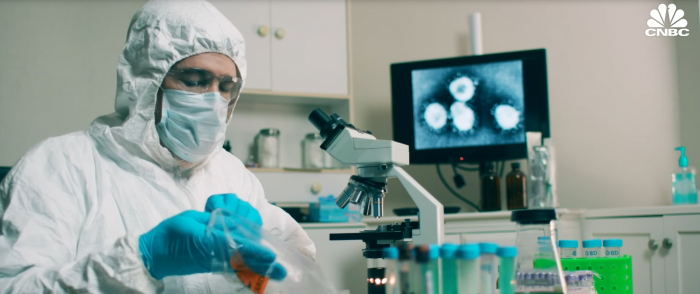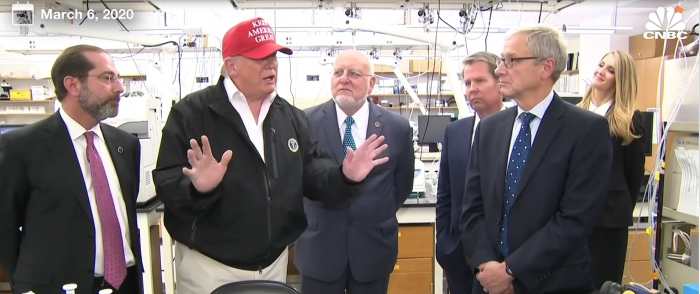‘Unburdened by a restrictive central regulatory body … private companies moved quickly to mass produce those tests, meaning they could be rolled out rapidly to the population…’

(Ben Sellers, Liberty Headlines) The great hero to emerge from the coronavirus crisis appears to be Dr. Anthony Fauci, the National Institutes for Health’s disease expert who has stood by the side of President Donald Trump and occasionally butted heads with him.
The Left, in particular, has made Fauci a focal point of its coronavirus rhetoric—claiming, when it is convenient to do so, that Trump should step aside and allow ‘experts’ to handle the situation, while generously heaping any blame on the president for a perceived lack of progress.
Trump, going against all instincts, has largely followed the advice of Fauci in areas such as the White House social-distancing guidelines, recently extended through April.
In fact, the US thus far has been successful in maintaining a far lower mortality rate than many of the other major countries that have been afflicted with the global pandemic.
But the even lower mortality rate in Germany, which is leading the world in its response despite its close proximity to some of the countries most ravaged by the virus, may suggest that Fauci—and many others like him—are actually a big part of the problem.
German Efficiency at Work
Several US media outlets recently have taken note of the European country’s success.
According to the virus-trackers at Johns Hopkins University, Germany had just over 800 deaths as of Wednesday with around 73,000 confirmed cases, making the mortality rate slightly over 1 percent.
The rate has risen somewhat over the past week but remains among the lowest, with most citing mass testing as the reason.
“The reason why we in Germany have so few deaths at the moment compared to the number of infected can be largely explained by the fact that we are doing an extremely large number of lab diagnoses,” said virologist Christian Drosten, whose team developed the first test for the new virus, according to the Associated Press.
Germany’s mobilization effort began in mid-January, around the time that the first case hit Europe.
“It was clear that if the epidemic swept over here from China, then we had to start testing,” Hendrik Borucki—a spokesman for Bioscientia Healthcare, which operates 19 labs in Germany—told the AP.
It was not long until concern over the virus reached American shores as well.
After reported cases in Washington state first surfaced, Trump—despite being in the middle of an impeachment trial led by partisan House Democrats—first assembled the White House’s Coronavirus Task Force on Jan. 31.
That, however, is where the paths of the two countries began to diverge.
A Tale of Two Countries

Germany’s response allowed for decentralized testing that could be achieved quickly and efficiently, thereby limiting the need for draconian mass-quarantines.
The AP estimated that Germany was currently conducting upward of 500,000 tests a week.
Meanwhile, rather than use existing test methods that had proven effective and easy to administer, the US Centers for Disease Control and Prevention scrambled to devise a unique testing procedure that was more complex and significantly hindered by government guidelines, according to another recent AP article.
All of the early tests had to be sent directly to the central lab at the CDC’s Atlanta headquarters, resulting in drastic delays, as well as shortages of the CDC’s proprietary tests.
In Germany, by contrast, much of the testing was outsourced to private companies thanks to its deregulated healthcare model.
“Unburdened by a restrictive central regulatory body, since healthcare is administered at the state level in Germany, private companies moved quickly to mass produce those tests, meaning they could be rolled out rapidly to the population,” wrote Time magazine.
Both countries are currently administering the tests for free, but while the US testing requires pre-screened patients to be exhibiting some symptoms and/or to have come in contact with someone who tested positive, Germany has been able to test a broader swath of the population, providing a better count of virus carriers who may be asymptomatic.
Some scientific experts—including the developers of an Oxford University model that has recently gained traction—speculate that a much larger portion of the population than initially theorized may be walking around with the virus and may even have developed a “herd immunity” to it while continuing to spread it to the more vulnerable segment of the population with compromised immune systems.
“Between countries there are several reasons why the death rate might vary, but they’re very small compared to the impact of how many people get tested,” Liam Smeeth, a professor of clinical epidemiology at the London School of Hygiene and Tropical Medicine, told Time. “Germany very rapidly rolled out testing to a very large number of people, relative to the population.”
Streamlining the Bureaucracy

The US response turned a significant corner after Trump declared a national emergency in mid-March—ironically using his broader, more centralized federal authority to circumvent some of the impractical hurdles.
While the president has pressed publicly for a fast response—including his early promises to streamline testing—the bureaucracy seems still to be standing in the way—not only in testing and containment matters, but also in the rush for a cure.
Fauci prominently second-guessed Trump’s optimistic promotion of the anti-malaria drug hydroxychloroquine as a promising potential treatment. He cautioned that evidence of the drug’s success was strictly anecdotal and that it still faced considerable clinical trials before gaining approval by the Food and Drug Administration for widespread use.
That process, optimistically, could take months if not years. Many other pharmaceutical companies face the same dilemma while developing vaccines.
Moderna, which just began its human trials, has touted the possibility of a virus vaccine by fall, according to Barron’s. Several others hope to begin trials this month.
But that waiting game, left in the hands of overly-cautious pencil pushers with regularly shifting goal posts, poses a serious risk for both Trump and the entire country as it continues to interfere with Americans’ daily lives and commercial activity.
Ticking Time-Bomb?

The president’s leading scientific advisers have already been doing what the scientific community does best—recalibrating their original hypotheses after the nationwide social experiment of ‘social distancing’ appeared to have yielded mixed results.
Trump has, likewise, been forced to retreat from his early optimism regarding an Easter-time return to normalcy and instead embrace the ‘expert’ projections of a six-figure death count.
“[I]n a matter of weeks, relying on sketchy and incomplete data, government experts have pivoted from offering common-sense steps to fight a virus to declaring government-imposed house arrest,” said American Greatness.
“‘Flattening the curve’ is old news,” it continued; “preventing the deaths of hundreds of thousands of Americans requires tyrannical diktats that a month ago freedom-loving Americans could scarcely imagine.”
The conservative site said that even if Trump continues following the best scientific advice promoting a measured and tempered response, public patience and goodwill may reach its peak by the end of the month, leaving him the target.
“The president is trying to do the right thing but this is a breaking point,” American Greatness said. “If Trump ruins the economy and torches his solid economic achievements based on a handful of flawed models and the evolving opinions of unsure advisors, it will be hard to walk it back.”
